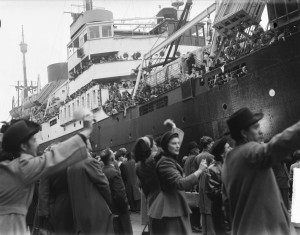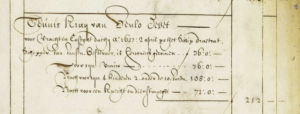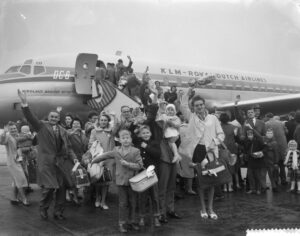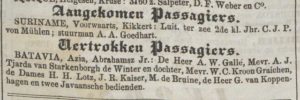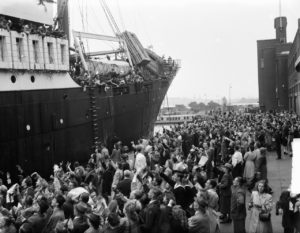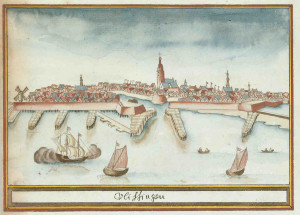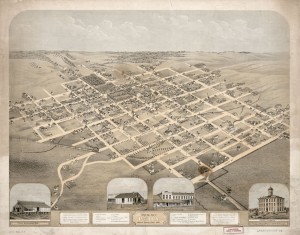Between 1865-1868, Jacob Kuyper published a series of atlases with municipal maps. These show the location of all the hamlets, villages, and larger towns in the municipality, as well as the main roads and railroads. The Kuyper maps are often available at the websites of archives or via Wikimedia Commons. This week we are looking at a map of Aalten in 1867. Interestingly, the map does not include Bredevoort in the colored outline of the municipality, even though Bredevoort had been part of the … [Read more...]
Quick tip – Were They the Only Immigrants in the family?
If you are researching an immigrant, they may not have been the only one in the family to immigrate. People often travelled in groups, consisting of friends and family members. Once an immigrant was established, they often encouraged others to follow. If you research their family back home, you may discover several others who also emigrated. Sometimes passenger lists will mention that they were joining a relative. … [Read more...]
Source: Emigrants to New Netherland (1650-1664)
The New York State Archives in Albany houses many colonial Dutch records. Among those records is an account book of the West India Company, which includes payments for passage to New Netherland from 1650 to 1664. This is a great source of information about New Netherland ancestors. Example: Teunis Kraij This entry for Teunis Kraij translates to: Teunis Kraij from Venlo, debit for passage and victuals when he came here on the ship Draetvat [Wire Cask] on 2 April 1657 AD, skipper Jan Jansen … [Read more...]
Quick tip – Dutch Emigrants to Australia database
The National Archives has a database of Dutch emigrants to Australia between 1946 and 1991. The database may only be used for historical research. The database is compiled based on the card catalogs that were created by the Dutch consulates in Sydney, Melbourne, and Brisbane between 1946 and 1991. The cards were organized by heads of household and contain information about the whole family. Only the head of household is indexed. Contents of the database The database provides basic data … [Read more...]
Quick Tip – Dutch Immigrants may not have Understood Each Other
Dutch immigrants sometimes settled in places where Dutch people from other parts of the Netherlands came too. This doesn't mean they could understand each other. Before the age of radio and television, there was no common Dutch language that everybody understood. Different regions had different dialects, different languages even. Frisian and Low Saxon are completely different from Flemish, to name three examples. To this day, people speaking in their local language or dialect won't be … [Read more...]
Dutch term – Passagierslijst
A passagierslijst is a passenger list. Most passenger lists are kept in the country of arrival. Passenger lists for people who emigrated from the Netherlands to another country, are rarely found in the Netherlands. But the passenger lists of people who travelled to the Netherlands may be found in Dutch archives. The Stadsarchief Rotterdam [Rotterdam City Archives] has the largest collection of passenger lists, including those of the Holland Amerika Lijn and the Koninklijke Lloyd. Passenger … [Read more...]
Ask Yvette – Are there Passenger Lists in Dutch Archives?
I often get asked if there are any passenger lists in Rotterdam or Amsterdam, of the people who departed from these ports to America, Canada, or Australia. Depending on the period, there may not be any. Passenger lists often went with the ship and were archived in the port of arrival, not in the port of departure. The archives of the shipping companies sometimes have passenger lists. For example, the Rotterdam City Archives have the archives of the Holland Amerika Lijn and its predecessors, … [Read more...]
Dutch term – Haven
A haven is a harbor. The Netherlands had and has some of the largest harbors in the world. They provided work for a range of occupations, both for people working at sea like fishermen and skippers, and for people working in the harbor like merchants, innkeepers and carriers. The harbors of Rotterdam and Amsterdam were also major ports of embarkation for emigrants leaving western Europe for North America. … [Read more...]
Quick tip – Emigrants sometimes went to a Notary
Before getting on board, an emigrant may have gone to a notary to: have a will drawn up (you never know if the ship will go down) give a power of attorney to a trusted friend or family member to handle their affairs enter into a work contract, including an agreement about the payment of the passage. This is especially true for richer emigrants, who had business affairs to put in order. They may have gone to a notary in their place of origin or to a notary in the their port of … [Read more...]
Quick tip – Don’t stop looking after they left
Don't stop looking for your family in a town just because they don't live there anymore. They may still own property there, have business partners there, or may be heirs of people who stayed behind. In notarial records, I often find references to children living abroad, for instance when one of their parents died and their estate needed to be divided. If your ancestors emigrated from the Netherlands while one of their parents or unmarried siblings was still alive, make sure to check the death … [Read more...]

